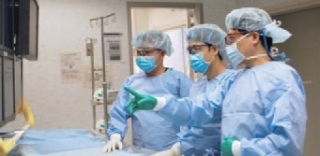
Our department provides medical care for patients with heart disorders, vascular disorders, hypertension, congenital heart disease, etc. Please check our website https://cardiovasc.m.u-tokyo.ac.jp/ for further details.
Medical services
One resident and two specialist doctors are assigned to each patient. At night or during holidays, two doctors are on duty for emergency patients. Our facility is a member of the CCU network; therefore, we provide round-the-clock emergency services for conditions such as acute myocardial infarction.
Diagnosis and treatment policy
An accurate assessment of the pathophysiology followed by prompt diagnosis and treatment are important when caring for patients with cardiovascular disorders. Following the guidelines in combination with advanced treatment, we also provide comprehensive treatment and care in close cooperation with other departments, with particular emphasis on the individual patient-oriented approach.
Specialties
Our department’s strength lies in the diversity of specialists in the cardiovascular field. Our hospital is a heart transplant center, and there are special outpatient clinics for pulmonary hypertension, congenital heart disease, valvular heart disease, cardiomyopathy, and Marfan’s syndrome.
Target diseases
Heart failure, ischemic heart disease, cardiomyopathy, arrhythmia, valvular heart disease, congenital heart disease, hypertension, pulmonary hypertension, aortic diseases, peripheral vascular disease, etc.
Advanced treatments/ Specialized treatments
Severe heart failure, Heart transplantation
We make a special effort to treat patients with severe heart failure, including assessing the indication for heart transplantation, using a ventricular assist device, and treating patients after heart transplantation. Therapeutic strategy is discussed by “Heart team” comprising cardiac surgeons, nurses and medical engineers.
Catheter ablation method
Radiofrequency energy emitted from the tip of the catheter is used to remove areas that are cause arrhythmia.
Special percutaneous coronary intervention
The Rotablator, a coronary angioplasty system that uses a highspeed rotating diamond-tipped burr to abrade hardened lesions. Excimer Laser Coronary angioplasty system can vaporize thrombi and ablate plaques.
Transcatheter Aortic Valve Replacement (TAVR)
Patients with severe aortic valve stenosis, particularly those at intermediate to high risk, are treated by TAVR.
Left Atrial Appendage Closure (LAAC)
LAAC is a proven one-time procedure that reduces the risk of stroke in patients with non-valvular atrial fibrillation, and the risk of bleeding that comes with a long term oral anticoagulant use.
Implantable cardioverter defibrillator (ICD)
A device that is implanted in the patient’s chest to deliver electrical therapy immediately when serious arrhythmia is detected.
Excimer laser lead extraction
When needed, such as during device infection, the laser technique is used for lead extraction by vaporizing the scar surrounding the device lead.
Percutaneous closure of atrial septal defect (ASD)/ Percutaneous closure of patent foramen ovale (PFO)
Transcatheter closure for ASD and transcatheter closure for PFO related with cerebral embolism are available at our hospital.
Frequently performed tests and descriptions
Outpatients
- Electrocardiogram (ECG at rest and during exercise stress)/Holter ECG
- Cardiovascular ultrasound
- Exercise stress echocardiography
- Coronary CT angiography/Cardiac MRI/Nuclear medicine test
- Cardiac rehabilitation
Inpatients
- Cardiac catheter examination
- Cardiac electrophysiologic examination
Departments/Divisions
Cardiovascular Medicine
Titles
M.D., Ph.D.
Expertise/Specialties
Ischemic heart disease, Heart failure
Research Interests
Cardiac fibrosis, Inflammation, Hypoxia research
Languages
Japanese / English
See More
Major diseases and numbers of inpatients treated
|
Disease name *1 |
Number of inpatients |
| 1 |
Ischemic heart disease |
326 |
| 4 |
Valvular heart disease |
27 |
| 6 |
Congenital heart disease |
20 |
| 9 |
Pulmonary hypertension/Pulmonary embolism |
152 |
*1: Classification based on the DPC system (2014)
Areas of expertise, treatment and examination methods
Treatment methods
- Catheter intervention
- Extracorporeal circulation auxiliary
- Auxiliary artificial heart and heart transplantation
- Catheter ablation
- Cardiac pacemaker and implantable cardioverter defibrillator
- Balloon pulmonary artery angioplasty (BPA)
Numbers of major operations and treatments performed
|
Name of operation/treatment |
Number |
| 1 |
Catheter intervention |
568 |
| 3 |
Cardiac pacemaker implantation |
45 |
| 6 |
Balloon pulmonary angioplasty |
27 |
| 4 |
Implantable cardioverter defibrillator (ICD) |
27 |
| 5 |
Cardiac resynchronization therapy with defibrillators (CRT-D) or pacemakers (-P) |
7 |
Numbers of major and specialized examinations conducted in this department
|
Name of examination |
Number |
| 1 |
Coronary angiography(excluding PCI) |
1,118 |
| 2 |
Electrophysiological examination |
23 |
| 4 |
Coronary artery CT scans |
409 |


